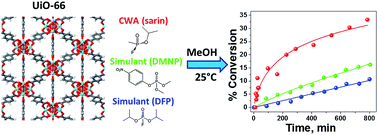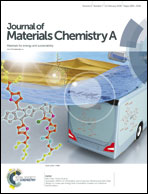Efficient MOF-based degradation of organophosphorus compounds in non-aqueous environments†
Abstract
Decontamination of sensitive electronics exposed to chemical contaminants such as chemical warfare agents (CWA) is incompatible with existing water-based/corrosive methods. The development of new chemistries to tackle this challenge is of great interest. In this paper we investigate the effectiveness of metal–organic frameworks (MOFs) to degrade organophosphorus compounds in non-aqueous environments, via a combined experimental-molecular modeling study. Emphasis is placed on understanding the effect of framework characteristics (metal identity and linker functional group) on the methanolysis of these toxic chemicals, along with identifying reactivity trends for relevant sarin (GB) simulants. Several representative materials based on a hexanuclear metal cluster were judiciously selected, including the well-known catalytically active MOF, UiO-66. Complementary insights into the vibrational and structural properties of these materials were provided by periodic density functional theory (DFT) calculations. Findings indicate that Zr is a more effective metal center to support the degradation of organophosphorus compounds in methanol, as compared to Eu and Y. Detailed investigation into the reactivity of three relevant simulant candidates (diethyl chlorophosphate, DECP, dimethyl 4-nitrophenylphosphate, DMNP, and diisopropyl fluorophosphate, DFP), revealed that nitro- and fluorophosphates are better surrogates to mimic the reactivity of GB in methanol, as compared to chlorophosphate-based molecules. Importantly, experimental results on the MOF based degradation of GB in methanol are reported here for the first time. Additionally, this is the first study that systematically investigates the effectiveness of using MOFs for the solvolysis of organophosphorus compounds, providing valuable insights for materials design and simulant downselection.



 Please wait while we load your content...
Please wait while we load your content...